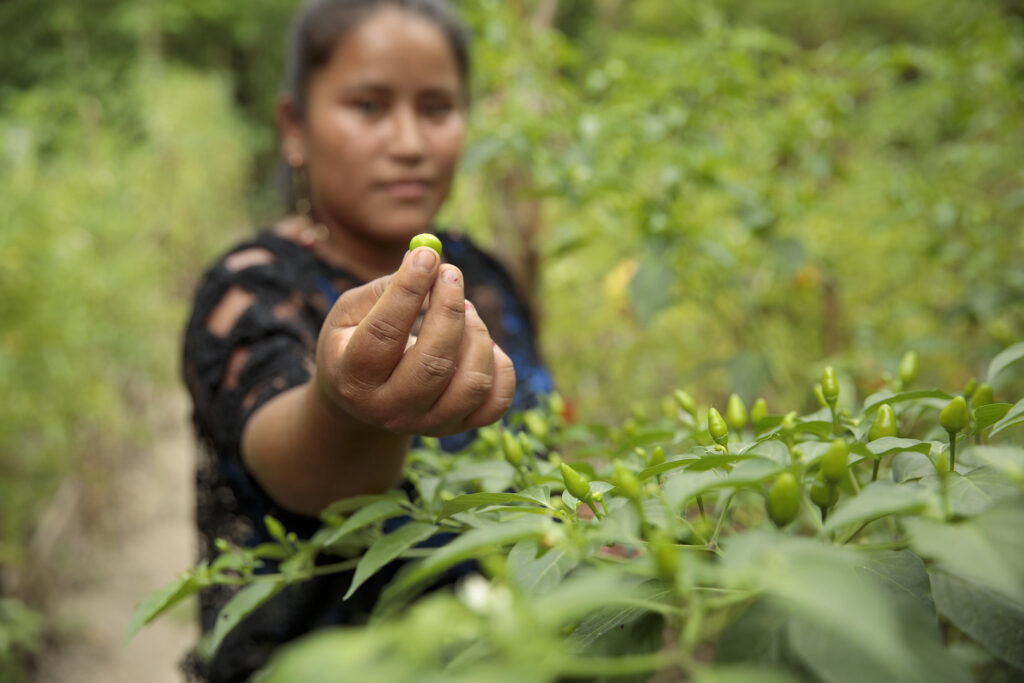

 A woman from the Indigenous community of Puente Viejo, Guatemala, harvesting medicinal plants. (Photo by UN Women / Ryan Brown, CC BY-NC-ND 2.0.)
A woman from the Indigenous community of Puente Viejo, Guatemala, harvesting medicinal plants. (Photo by UN Women / Ryan Brown, CC BY-NC-ND 2.0.)
Preserving Indigenous Knowledge: The Role of Traditional Medicine
It is estimated that 88% of all countries incorporate traditional healing practices—such as Indigenous medicine, herbal treatments, and acupuncture—into their healthcare systems. At the same time, Indigenous peoples, who make up just 5% of the world population, protect 80% of the planet’s biodiversity. This contrast highlights the urgent need to preserve the knowledge systems that sustain not only communities but entire ecosystems. Despite this invaluable role, Indigenous medicine is often overlooked, underfunded, and threatened by industrialized healthcare, climate change, and legal barriers that criminalize traditional healing.
Traditional Medicine as Decolonial Resistance
The persistence of traditional medicine in post-colonial contexts represents resistance to systems that have marginalized Indigenous communities in healthcare. Today, many traditional medicine practitioners collaborate with Western biomedical models, contributing to culturally relevant healthcare solutions. Indigenous medical knowledge, from plant-based remedies to holistic wellness approaches, provides insights beyond symptom management—offering cultural anchors that foster resilience and identity amidst modern pressures.
Indigenous Women: Keepers of Traditional Wisdom
Among these practitioners, Indigenous women stand at the forefront. As knowledge keepers, healers, and midwives, they have sustained traditional medicine despite ongoing gendered, racial, and colonial challenges. Their work remains critical in addressing the physical, mental, and environmental consequences of colonization. Yet, many face significant obstacles, including restrictive policies, land dispossession, and the loss of intergenerational knowledge due to forced assimilation.
Amplifying Indigenous Women in Decolonial Health
Indigenous women’s roles in traditional medicine are often under-recognized in global health discussions. Environmental degradation, food insecurity, and systemic health inequities disproportionately affect Indigenous women, making it essential to amplify their voices in academic and policy spaces. Highlighting their knowledge challenges dominant healthcare narratives and promotes the inclusion of Indigenous practices in mainstream discourse. Supporting Indigenous women’s health initiatives can also benefit entire communities and foster more inclusive healthcare systems.
Call for Papers: Special Edition of The Fourth World Journal (FWJ) – January & June 2026
In response to this need, the Center for World Indigenous Studies (CWIS) is issuing a Call for Papers for a special two-part issue of its peer-reviewed Fourth World Journal (FWJ).
This Special Edition (January & June 2026) will explore Indigenous women’s roles in traditional medicine, bridging theory and practice to examine topics such as Indigenous medicine and women’s health, the effects of colonialism, feminist and decolonial perspectives, food sovereignty, environmental knowledge, and Indigenous arts, sciences, and collaborative research. It will bring together diverse perspectives that honor the expertise of Indigenous women in health, community care, and ecological protection, highlighting their contributions to local and global well-being.
Who Should Submit?
We welcome submissions from scholars, activists, practitioners, and authors, including empirical studies, theoretical papers, case studies, community narratives, policy analyses, and creative works that highlight Indigenous women’s resilience and leadership in traditional medicine.
About CWIS & FWJ
For over 40 years, CWIS has amplified Indigenous voices and issues globally. The Fourth World Journal provides a platform for research, commentary, and analyses on the experiences of over 5,000 Fourth World Nations, representing 1.9 billion people.
Submission Guidelines
We seek papers on how Indigenous women are shaping the future of traditional medicine. Topics may include:
How to Submit
For submission details, deadlines, and formatting guidelines, visit CWIS/FWJ Call for Papers. Contributions should document and advocate for the protection and recognition of Indigenous women’s knowledge in global health.
Join the Conversation
Contributing to this special edition helps amplify Indigenous women practitioners and knowledge keepers, ensuring their invaluable contributions are recognized in global health, biodiversity, and sovereignty discussions. We look forward to your submissions.
References:
Bodeker, G., & Kariippanon, K. (2020). Traditional medicine and indigenous health in indigenous hands. In Oxford research encyclopedia of global public health. Oxford: Oxford University Press.
Dhillon, C. M. (2020). Indigenous feminisms: Disturbing colonialism in environmental science partnerships. Sociology of Race and Ethnicity, 6(4), 483-500.
Pan American Health Organization. (2023, August 28). WHO Global Summit on Traditional Medicine highlights scientific evidence and integration into health systems. Pan American Health Organization. https://www.paho.org/en/news/6-9-2023-who-global-summit-traditional-medicine-highlights-scientific-evidence-and-integration
United Nations Press. (2022, April 25). Extraction operations on Indigenous Peoples’ land without consent cause irreparable harm, speakers stress, as Permanent Forum begins session. https://press.un.org/en/2022/hr5467.doc.htm
The library is dedicated to the memory of Secwepemc Chief George Manuel (1921-1989), to the nations of the Fourth World and to the elders and generations to come.
access here